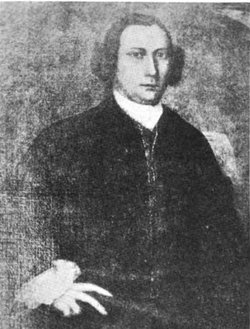
(Luther Jotham: A Journey for Country and Community) An excerpt from the paper: On paper, Luther Jotham’s Revolutionary War service record reads like a typical service record of a Minute Man from rural Massachusetts in 1775. Volunteering to serve at a minute’s notice in case of an emergency, Jotham trained weekly with his neighbors in battle tactics. On April 19, 1775, when the alarm sounded at Lexington and Concord, Jotham joined his company of Bridgewater Minute Men in defense of their community.
Luther Jotham, however, differed from most Minute Men. As a free man of color, Massachusetts law excluded men like Jotham from participating in militia training days in peacetime. Yet in the midst of a looming emergency, he volunteered to protect his neighbors. Following the April 19 alarm, Jotham ultimately signed up to serve on four different occasions during the Revolutionary War. (photo courtesy of National Park Seervice)
Vassalboro
Records tell of a Kennebec Valley slave-owner, Captain Abiel or Abial Lovejoy (Dec. 15, 1731 – July 4, 1811), who lived in Vassalboro from 1776 and in Sidney after the west side of the Kennebec River became a separate town in 1792 (see the Feb. 3 issue of The Town Line). He was a native of Andover, Massachusetts, who came to the lower Kennebec Valley as a Massachusetts soldier (rising to the rank of captain) in the 1750s.
An on-line source says when Lovejoy and his wife Mary (Brown) married in 1758, they were given their first two slaves, a man named Boston and an unnamed woman who became Boston’s wife. After they moved to Dresden in 1761, Mary’s father gave them two more slaves, Salem and Venus.
In 1776 the household moved to a farm on the west side of the Kennebec, where Lovejoy became a leading Vassalboro citizen. Henry Kingsbury, in his 1892 Kennebec County history, listed him as a selectman from 1779 through 1784, apparently doubling as town treasurer in 1780. The on-line source tells two stories from those days.

Capt. Abiel Lovejoy
One is Lovejoy’s reaction when told Massachusetts ordered slaves freed, in 1788: he summoned “Salem and Venus, and offered them their liberty. They refused to leave and Salem’s answer to the Squire was, ‘You’ve had all de meat, now pick de bones.'”
The second story is about the time Lovejoy brought a jug of liquor to the field where a mixed group of slaves and hired hands was cutting hay, not to his satisfaction. When he demanded to know who did the poor job, the hands blamed Boston. Lovejoy said since Boston did all the work, “he shall have all the grog.”
The Lovejoys, their child who was born and died in 1784 and Boston, Venus and Salem were all buried in a family cemetery on the Sidney farm. The on-line source says, “As similar stones marked the burial place of the negroes, it is impossible to know which are the graves of the master and mistress and which are the graves of their servants.”
Remington Hobby (also Hobbey or Hobbie) was another Vassalboro slave-owner, briefly. Kingsbury called him a prominent Vassalboro citizen, listing him as town meeting moderator in 1774, selectman in 1777 and treasurer in 1778.
One on-line genealogy says Hobby was born in 1746 and was a Harvard College graduate. Converted to Quakerism, he became a “powerful” preacher, and died in Winslow in 1839. Different sources list his wife’s name was Anstrus or Anstress. The genealogy writer just cited said he married her about 1837, pointed out that by then he was in his 90s and wondered if there were a father and son of the same name and it was the son who got married in 1837.
The story in the Vassalboro Historical Society records (in the form of a letter in the Feb. 12, 1910, “Kennebec Journal”, reprinted in the Feb. 2, 1997, issue of what was by then the Central Maine Newspapers) says that a Boston merchant who owed Hobby money gave him as part payment an enslaved Black man from Guinea named Denmark. Hobby gave Denmark his freedom and sent him to join the Black “colony” in northeastern China.
Denmark soon returned to Vassalboro, claiming his new neighbors had robbed him, the story continues. After Hobby’s death, Hobby’s son John and John’s brother-in-law, Steven Jenkins from China, took care of Denmark. When he died, they arranged his burial in the Friends Cemetery on the east (lake) side of Neck Road in China.
Kingsbury’s history talks about a Black section of a cemetery in East Vassalboro in the early 1800s. He wrote that the cemetery was beside the First Baptist Church building on Elm Street.
(The1856 map of East Vassalboro shows the south end of present-day Main Street, from the four corners south, as Elm Street; north of the four corners is Water Street. Kingsbury wrote in 1892 that John Greenlowe was “well remembered” by East Vassalboro residents for the iron plows he patented and manufactured at the dam and for planting “most of the trees that so beautifully shade the streets of the village.”)
The First Baptist Church was organized June 3, 1788, and prospered for about a decade. In the 19th century membership declined, and about 1832 the building was sold for $43 to Ezeziel or Ezekiel Small, who let it deteriorate until it was removed.
This church building was “north of the old grave yard and south of the outlet landing,” Kingsbury wrote. The cemetery had not been maintained, and after the church was torn down, it was ignored, “except that the portion next to the mill [one of several owned by members of the Butterfield family] has been used by the colored people.”
By 1892, Kingsbury wrote, the area north of the mill was “an enclosure called the Baptist burying ground,” without headstones or grave mounds, shaded by tall elms along the street. The site of the former church had become “John Warren Butterfield’s garden.”
In her Vassalboro history, Alma Pierce Robbins gave the First Baptist Church a few paragraphs, including a reference to “the Baptist Burying Yard at the outlet of 12 Mile Pond [China Lake].”
At the Vassalboro Historical Society, the following Black families are listed from the 1810 census: James Bennett, with a three-person household; Prince Brown, 10 people; John Foy, six people; Luther Jotham, seven people.
In 1820, census-taker Abijah Smith listed Jotham with two others in his household, an adult woman and a male child. In 1830, he was living with two adult women and two male children. Smith also listed Bennett, but not Brown nor Foy.
Your writer has found information on only one of these families, the Jothams.
The author of an on-line paper by the Boston National Historical Park (hereafter BNHP), titled Luther Jotham: A Journey for Country and Community, used military, census and other records to find details about Jotham’s life.
The BNHP writer said Jotham was born a free Black in Middleborough, Massachusetts, about 1751. Sometime before 1775 the family moved to Bridgewater, Massachusetts. As tension with Great Britain increased, rules were changed to allowed Colored men to join the militia; when the Revolution began April 19, 1775, Jotham was a member of the Bridgewater Minute Men.
The essayist surmised he might have joined for the shilling he earned for every half day of training, or because “For men of color, joining a military community helped forge a more equal status with their white counterparts.”
After this first stint, Jotham enlisted in militia units three more times. On Aug. 1, 1775, he began five months’ service as a private “in Josiah Hayden’s company in the Plymouth County regiment of militia, stationed in Roxbury.” From January to March 21, 1776, he was again in Roxbury as a member of “Captain Mitchell’s company in Colonel Simeon Cary’s regiment,” identified in another on-line source as the Plymouth and Barnstable County Regiment (Cary was also from Bridgewater, which is in Plymouth County).
In September 1776 Jotham re-enlisted in Cary’s regiment. The regiment was ordered to New York City, then partly under British control.
On Sept. 16, British forces attacked near Harlem Heights, and General George Washington ordered several regiments, including Cary’s, to counter-attack. This was Jotham’s first experience of battle, the BNHP writer said; it was soon followed by another at White Plains. Jotham then “faithfully completed his term of service on December 1, 1776 and returned home to Bridgewater.”
Jotham’s fourth enlistment, in October 1777, put him in “Captain Nathan Snow’s company, in Colonel [Cyprian] Hawes’ regiment,” which was sent to Rhode Island in an unsuccessful effort to chase the British out of Newport. The American success at Saratoga, New York, on Oct.17, 1777, took enough pressure off New England that militia units were sent home that fall.
The BNHP writer found that Jotham and Mary Dunbar were married soon after he came home. In January 1779, he wrote, Jotham paid 320 pounds for “about 15 acres of land.” He thereby elevated his status from “labourer” (who worked for someone else) to “yeoman” (who “farmed his own land”) in relevant documents.
The couple had three children, Loriana, Lucy and Nathan.
The BNHP writer found records that Bridgewater officials “warned out” Jotham – and many others – in November 1789. Such a warning, the writer explained, was a notice to anyone who might become a town charge that he or she was not eligible for town support, and a demand for evidence of self-sufficiency. Since Jotham was a landowner, the writer surmised that his getting such a notice might be evidence of racial discrimination.
Jotham apparently satisfied the selectmen, because the 1790 and 1800 censuses showed his family in Bridgewater.
Sometime in the early 1800s, the Jothams moved to Vassalboro, where he bought 20 acres and presumably continued farming. The BNHP writer did not know why he moved to Maine, nor why he chose Vassalboro.
Mary Jotham died before 1816, and all three children by 1820. On May 25, 1816, Jotham married his second wife, Reliance Squibbs; they had two more children, Mary Anne and Orlando. Rachel and both her children had also died by May 1820, when Jotham applied for one of the veterans’ pensions the U. S. Congress approved in 1818.
(Robbins said that the 1818 federal law set pension payments for anyone who had served at least nine months during the Revolution and was in “reduced circumstances:” privates got eight dollars a month, officers twenty dollars a month.)
The BNHP writer found Jotham’s application, in which he wrote that his property consisted of “a house, small hut, a few tools and household items, and several animals, including one cow, three sheep, and one pig.” He said his annual income was $5; at age 69, he was unable to work much.
“Jotham seemed well connected to other Black families living in Vassalboro and the surrounding area. His pension application includes many testimonies from friends and acquaintances who vouched for his military service,” the BNHP writer said.
Jotham was awarded an annual pension of $96.
On Dec. 20, 1821, Jotham (by then about 70 years old) married for the third time, to a woman information at the Vassalboro Historical Society identifies as Rhoda Parker or Rhoda Dunbar. The BNHP writer did not list a last name for Rhoda; he said the couple had “at least” three children.
The next set of documents the writer found date from August 1827, when a Vassalboro overseer of the poor found that Jotham was mentally incompetent and arranged for a man named Abijah Newhall to be his legal guardian. Sometime after the 1830 census, the Jothams moved to China, where Luther died on June 22, 1832, aged 81, and, the writer said, was buried in the Talbot Cemetery.
Rhoda applied for a widow’s pension in 1860, when she was 73. The BNHP writer did not say whether her application was successful.
The writer concluded with a summary that applied to many Black veterans.
“Jotham attempted to build a better life for himself in the new nation he helped fight for. Though respected for his service by those who knew him personally, his honorable status as a Revolutionary War veteran did not make him invulnerable to the “colorphobia” that plagued many in his community.”
The writer continued by pointing out that many veterans, regardless of their race, eventually had to go through the humiliating process of demonstrating that they were so poor they needed a federal pension.
“Luther Jotham’s story is just one of many post-war experiences of ordinary soldiers who later struggled to support themselves, despite the valiant sacrifices they made while serving this country in its fight for liberty and democracy.”
Main sources
Kingsbury, Henry D., ed. , Illustrated History of Kennebec County Maine 1625-1892 (1892).
Robbins, Alma Pierce, History of Vassalborough Maine 1771 1971 n.d. (1971).
Websites, miscellaneous.






 Majority does not support lowering taxes
Majority does not support lowering taxes








